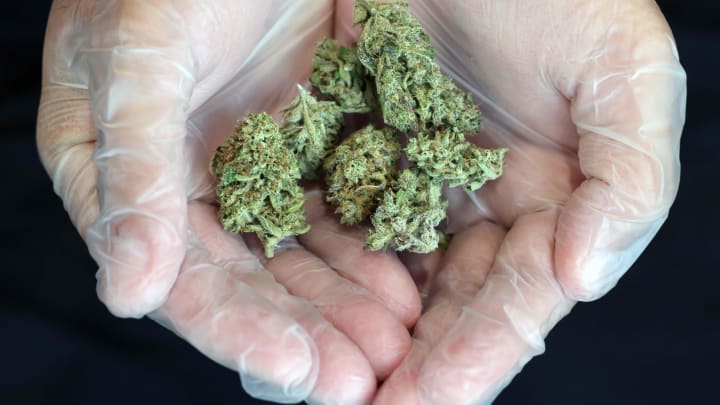NCAA Lifts Cannabis Ban, Could We See NIL Weed Partnerships?

Late last month, the NCAA formally voted to remove Cannabinoids and its psychoactive THC component from the banned substances list; the modification to NCAA drug testing policy went into effect immediately. This decision follows the trajectory of many major American professional sporting leagues; the NBA, MLB, and NHL have all fully removed cannabis from drug testing –– the NFL does not test in the offseason, and it is reported that full removal of cannabis testing will be a focal point in the next Collective Bargaining Agreement.
In 2014, Colorado became the first state to legalize recreational marijuana. Over the last decade, twenty-three other states joined in full marijuana legalization, and several other jurisdictions have either legalized medical marijuana or decriminalized possession of small amounts of pot. While marijuana is still illegal at the federal level, a noticeable shift in societal perception has swept the nation, and athletes, like Kevin Durant, Calvin Johnson, Randy Moss, and many more, have become vocal supporters of the therapeutic benefits of the drug. Some of the most notable entrepreneurs in the cannabis industry are current and former professional athletes: Shawn Kemp, Marshawn Lynch, Mike Tyson, and the Diaz brothers all have their own line of cannabis products.
For an industry with tremendous athlete attachment in both usage and production, it would follow that NIL weed endorsements would be a natural and mutually beneficial enterprise, but will we see deals between cannabis companies and student-athletes? The regulatory landscape of cannabis advertisements, state NIL legislation, school policies, and social media restrictions on cannabis content make NIL weed activations much more challenging than NIL deals in virtually any other industry; however, it is not impossible.
Let us start our discussion with an important disclaimer: This article is not legal advice. I am not a cannabis attorney. If you are interested in conducting any cannabis marketing efforts with student-athletes, please advise an attorney who specializes in this area of law.
For athletes in the twenty-six states that have not legalized recreational marijuana, it is highly unlikely a deal with a cannabis company could be executed. While several of the states that have yet to legalize recreational marijuana offer some level of medical marijuana, those jurisdictions often have strict rules regarding the advertisement of such products: Utah imposes a complete ban on medical marijuana advertisements, and Pennsylvania, like many other states, requires cannabis companies to comply with federal regulations on prescription drug advertising and must receive prior approval from the state’s Department of Health.
For the twenty-four states and the District of Columbia that allow for recreational marijuana use, advertisement compliance is more lenient. In these states, it is more feasible to see a partnership between a student-athlete and a company in the cannabis industry. But just because marijuana is legal in these jurisdictions, student-athletes are not in the clear to enter into partnerships just yet; many states include “morality clauses” in their NIL legislation. Such language precludes student-athletes from engaging in NIL partnerships with morally scrupulous industries, and cannabis is often expressly prohibited.
Illinois is one such state with legalized recreational marijuana and an express ban on student-athletes from engaging in any such promotion. Illinois state NIL law reads, “No student-athlete shall enter into a publicity rights agreement or receive compensation from a third party licensee for the endorsement or promotion of gambling, sports betting, controlled substances, cannabis, a tobacco or alcohol company, brand, or products, alternative or electronic nicotine product or delivery system, performance-enhancing supplements, adult entertainment, or any other product or service that is reasonably considered to be inconsistent with the values or mission of a postsecondary educational institution.”
For institutions in states that prohibit NIL engagements with morally scrupulous industries, not all hope is lost; many NIL Collectives have implemented partnerships with alcohol companies to evade such morality clauses. Last year, Grey Duck Brewing created a special “ICON” beer to support the ICON Collective at the University of Illinois by pledging 20% of revenue from the sale of the beer to student-athletes represented by the collective. While the state law expressly prohibits direct partnerships between student-athletes and alcohol distributors, utilizing the collective created a loophole for those in the alcohol industry to tap into the NIL market and the rabid and thirsty fanbases of college sports.
It is conceivable for cannabis companies to exploit this loophole in much the same way. If a cannabis company wanted to offer a product to commemorate a NIL collective and give a portion of the sales to student-athletes via the collective, nothing could stop the partnership outside of a collective’s apprehension. A more conservative-leaning fanbase, like that of the downstate University of Illinois, might respond differently than the fanbase of a more liberal, metropolitan institution like Northwestern towards supporting a partnership between a cannabis company and a NIL collective. If big boosters who fund NIL collectives harbor negative feelings towards marijuana, such a partnership could be so upsetting that it would ultimately harm the aggregate fundraising efforts of any NIL program by alienating a fan base.
While some states, like Illinois, have express bans on NIL activations in the cannabis industry other states opt to give deference to individual universities in deciding what industries and products student-athletes can and cannot enter into partnerships with. Kentucky, a state that has legalized medical marijuana and has an active bill that could introduce recreational marijuana by 2026, articulates its law to give schools autonomy, stating that each instiution has the ability to nix “potential agreements or contracts for compensation of name, image, and likeness that the postsecondary educational institution determines is incompatible or detrimental to the image, purpose or stated mission of the postsecondary educational institution.” In these states, each university would have full power to determine if athletes can engage with cannabis companies.
The states that do not feature morality clauses leave little ability for institutions to curtail such partnerships. In California, as in many other states, the only time a school can disallow a partnership from a third party is if it conflicts with a term of a team contract. California is more precise than other states by specifying that a team contract of a postsecondary educational institution’s athletic program shall not prevent a student athlete from using the athlete’s name, image, likeness, or athletic reputation for a commercial purpose when the athlete is not engaged in official team activities.”
The language California has implemented, similarly constructed by other states like Maryland and New Jersey, ensures the right for team contracts not to be overbroad and disallow things not directly related to playing or official practice time. Not every state defines a team contract as narrowly. Still, it is likely that team contracts would not preclude such activity.
States without active NIL legislation give schools little power of legal enforcement for a university to disallow such a contract. However, it may be harder for student-athletes to find redress for any retaliation from universities that stems from an athlete’s engagement in a cannabis partnership in the absence of NIL legislation.
In jurisdictions with legalized recreational marijuana and remain silent on prohibited industries in NIL or do not have active NIL legislation, there appears to be a pathway toward collaboration with athletes.
Most influencer-based marketing activations, NIL included, are paid social media advertisements. When it comes to cannabis advertising, this common marketing medium may have to be rethought. Instagram is often cited as the most prolific, easiest to implement, and highest ROI platform for influencer-based marketing; however, Meta policy (Instagram’s parent company), heavily restricts the ability to promote any commercial activity regarding THC or psychoactive cannabis products or any paraphernalia such as bongs, rolling papers, and vaporizers. Regardless of state cannabis policy, Instagram does not allow for advertisments that promote the sale of cannabis.
X, formerly Twitter, allows cannabis advertisements. However, the platform does not allow for “sports persons” to be involved in the campaign, rendering any NIL activation a violation of community guidelines per se. The restrictions implemented by Meta and X takes out two of the most major mediums of social media advertisement. While not as explicitly stated, TikTok has been reported not to allow any advertisement of marijuana or related products.
Snapchat regulations allow for limited cannabis advertising, where legal, with appropriate targeting. Without further guidance, it appears that this is not a dead-end platform for a NIL cannabis partnership.
With limited and murky options in the social media space, cannabis partnerships would have to diverge from the status quo. Traditional print, digital, and billboard advertisements remain viable for NIL cannabis partnerships. In addition, more adventurous concepts, like in-store appearances and licensed products, could be actualized. Many restaurants have partnered with athletes to create signature items that license the naming rights from an individual athlete –– former University of Tennessee quarterback Joe Milton partnered with McDonald’s to create the “Milton Meal” off of his namesake and current Falcons running back Bijan Robinson started his Bijan Mustardson brand of mustard while still a student-athlete at the University of Texas.
Athletes in jurisdictions that have legalized recreational marijuana and no NIL legislation prohibiting marijuana deals could license their NIL to have cannabis strains or other weed paraphernalia named after them. For the more ambitious and business-savvy athletes, the possibility of creating their own paraphernalia product using their name, image, and likeness is on the table.
It is important to remember that regulations surrounding cannabis advertisements differ by state; however, broadly speaking, legislation mandates that those involved in any cannabis advertisements are at least 21 years old and, by differing degrees of scrutiny, do not advertise to populations that are likely to have a significant portion of their audience be under 21. Colorado’s only language regarding cannabis advertising for recreational marijuana states that cannabis companies “may advertise in television, radio, a print publication or via the internet only where at least 71.6 percent of the audience is reasonably expected to be at least the age of 21.” The main takeaway is that placement and medium of advertisement must be carefully constructed to avoid violating state law. Additionally, any NIL cannabis deals would have to be with those who have already reached the age of 21, reserving these deals predominantly for juniors and seniors.
Many states articulate that beyond the restrictions on the placement of advertisements in areas concentrated by those not yet 21, advertisements must also not be especially attractive to those under 21. Washington cannabis law, like many other jurisdictions, includes a provision that prohibits any advertisement “designed in any manner that would be especially appealing to children or other persons under twenty-one years of age.” NIL marketing inherently holds influence on universities populations with large amounts of fans under 21; it could be reasonably construed in these jurisdictions that NIL advertisements are designed to be especially attractive to people under 21.
There are very few places in the United States where it is attainable to create NIL cannabis partnerships. In states like Colorado that lack strict legislative regulation on cannabis advertising and NIL morality restrictions, a pathway exists; however, it is not without nominal risk and will take strategic effort to execute a valuable partnership without reliance on traditional social media advertising. States with stricter regulations on cannabis advertisements will require extreme care and creativity to remain compliant and expose brands to significantly more risk.
Will the 2024-25 season be the first time we have such a deal? Only time will tell. If there is any enterprise willing to push boundaries, it is the cannabis industry. Due to the notorious scrutiny and media coverage of big-time college sports, the risks may outweigh the rewards for both brands and athletes.
